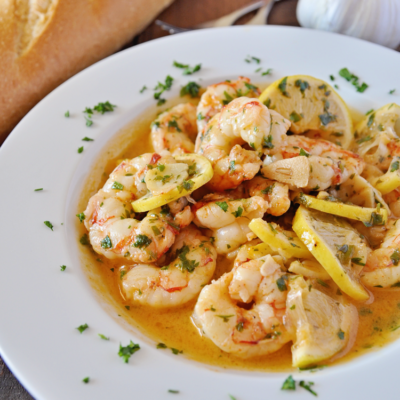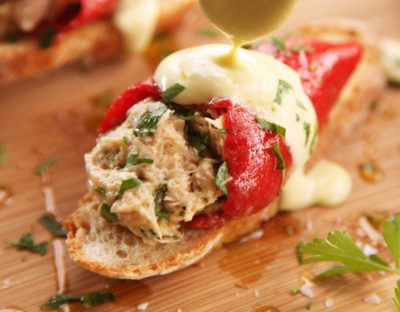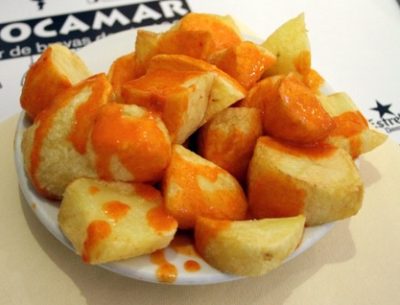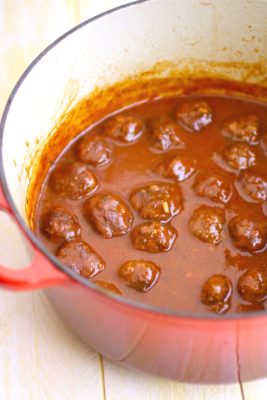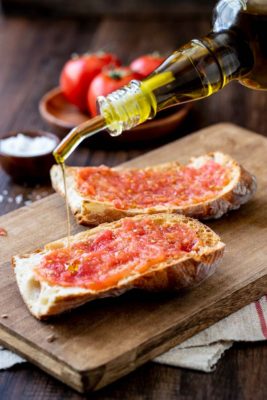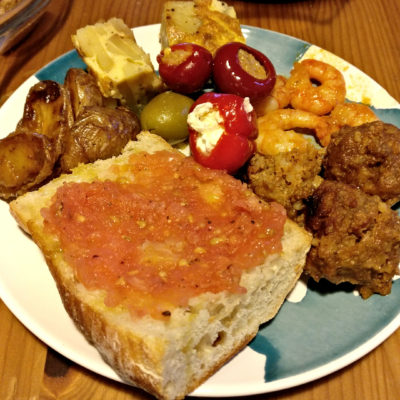 Katy mentioned last weekend that she’d never had tapas. That made me sad, so I went ahead and fixed that with a bunch of homemade goodies made from scratch: tortilla, patatas bravas, albondigas, pan con tomate, gambas and some jarred olives and stuffed peppers.
Katy mentioned last weekend that she’d never had tapas. That made me sad, so I went ahead and fixed that with a bunch of homemade goodies made from scratch: tortilla, patatas bravas, albondigas, pan con tomate, gambas and some jarred olives and stuffed peppers.
Tag: tapas
[recipe] Tapas – Gambas
12 jumbo prawns
2 tbsp olive oil
1/4 cup white wine
1/2 lemon, cut into thin slices then halved
1 tsp grated fresh ginger
1 tsp hot paprika
sea salt
black pepper
chopped parsley, to garnish
crunchy baguette, to serve
Season shrimp that have been peeled and deveined with sea salt, freshly cracked black pepper and paprika.
Heat olive oil and ginger in a non-stick frying pan with a medium-high heat. Once the oil is hot, add the prawns to the pan and cook for about 1 minute, then flip the shrimp around and add white wine and lemon to the pan, toss, and cook for another minute
Transfer everything in the pan into a shallow serving bowl. Garnish the dish with fresh parsley and serve with crunchy bread.
[recipe] Tapas – Pimientos del Piquillo rellenos de atún
1 tin of light tuna in olive oil
1 can of whole piquillo peppers
1 hard boiled egg, chopped
1 parsley bouquet
1/2 tsp sweet paprika
10-12 black olives, chopped
1 small shallot, chopped
1 tbsp wine vinegar
salt
extra virgin olive oil
Drain the peppers and pat dry with a paper towel.
Finely chop the olives, shallot, 1 sprig of the parsley, egg.
Drain the tuna. In a small bowl, break the tuna into flakes using a fork.
Mix all chopped ingredients with the tuna. Sprinkle with vinegar and sweet paprika. Drizzle oil on top and mix thoroughly. The mixture has to be consistent but not dry, so if necessary, add some of the brine from the peppers.
Take a teaspoon or a fork and stuff the peppers. Place the stuffed peppers on slices of crusty bread. Splash with extra virgin olive oil or a bit of aioli.
[recipe] Tapas – Patatas bravas
This recipe is for the sauce. You can either fry (preferred) or roast some fingerling potatoes.
1/2 cup of olive oil
1 tsp of pimentón picante (hot smoked paprika)
2 tsp of pimentón dulce (sweet smoked paprika)
1 tbsp flour
250ml of warm chicken broth
salt to taste
Heat the olive oil in a small saucepan over medium heat.
Remove the pan from the burner before it starts to smoke.
Add the paprika and stir until they form a paste. Stir in the flour until combined.
Add the broth little by little, stirring constantly, until the sauce reaches the desired consistency.
Season with salt to taste.
Pour over warm fried potatoes and enjoy!
The finished product should be bright orange and neither thin nor creamy. You can adjust the level of spiciness by increasing the ratio of paprika or by adding a bit of hot sauce!
[recipe] Tapas – Albondigas en salsa
For the meatballs:
200g ground beef
200g ground chorizo
1 small red onion, chopped finely
1/2 teaspoon ground cumin
1/2 teaspoon paprika
1/4 teaspoon salt
1/4 teaspoon ground black pepper
1 egg
2 tablespoons Parmesan cheese
1/4 cup breadcrumbs
1/2 tablespoon olive oil
For the sauce:
2 green onions, ends trimmed, cut into small pieces
250ml red wine
250ml beef broth
500ml tomato sauce
1/2 teaspoon salt
1/4 teaspoon cumin
1/2 teaspoon paprika
1/4 teaspoon ground black pepper
1/4 teaspoon red pepper flakes
2 tablespoons flour
1 bay leaf
Line a baking sheet with waxed paper and set it aside.
Combine all meatball ingredients in a large bowl. Use your hands and mix all the ingredients together as best as possible.
Pinch off 2-inch pieces from the mixture and roll each into individual meatballs.
Place the meatballs on the lined baking sheet, then refrigerate for about 30 minutes.
Add the olive oil to a Dutch oven over medium heat. When hot, add the meatballs (you may need to work in batches) to brown them, stirring to get all sides, for about 4 minutes.
Use a slotted spoon to remove the meatballs from the Dutch oven.
For the sauce:
In the cooking oil from the meatballs, fry the onion. Cook for a minute or so.
Add the wine, beef broth, and tomato sauce. Stir and cook for a minute or so, then add the salt, cumin, paprika, and ground black pepper to the mixture. Stir and cook for a few minutes.
Add about 1/4 cup of the liquid to a small bowl. Whisk the flour into the bowl until it is smooth.
Transfer the flour mixture to the sauce, whisking to incorporate it. Add the red pepper flakes and bay leaf.
Lower the heat to simmer. Add the meatballs and cook for about 20 minutes.
Remove and discard the bay leaf.
Add the sauce and the meatballs to a serving bowl and serve warm.
[recipe] Tapas – Pan con tomate
4 medium-sized tomatoes on vines
Extra virgin olive oil
Salt to taste
1/2 tsp sugar (if needed to decrease acidity in off-season tomatoes)
1/2 loaf of whole-wheat, rustic, or unleavened bread (works best for avoiding sogginess and maintaining crunchiness)
Cut the bread into slices of toast with medium thickness. Arrange on a baking sheet, and toast the bread slices in the oven at 225 degrees Fahrenheit for about five to seven minutes, flipping halfway through.
Wash and dry the tomatoes. Cut them in half, and grate them using a box grater, discarding the stem and skins.
Once the tomatoes are grated, reserve in a small bowl and add about 1 tablespoon of olive oil and a pinch of salt. Taste, and add a pinch of sugar if necessary (when using off-season tomatoes they might be too acidic).
Carefully spoon the tomato mixture onto the slices of toast, and top with a drizzle of extra virgin olive oil and a sprinkle of sea salt.
Optionally, top with a slice of jamón (Serrano or Iberian) for additional flavor, and a more hearty toast. Enjoy!
[Recipe] Tapas – Spanish Tortilla
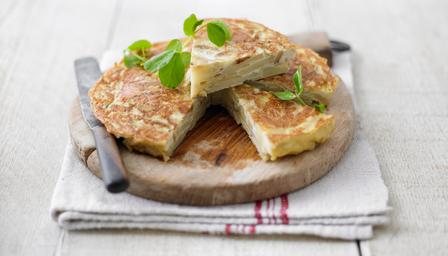
Ingredients
1 medium onion (110 g)
4-5 medium waxy potatoes (600g)
3 tablespoons olive oil
5 large eggs
salt and freshly milled black pepper
Preparation method
First some points to note. The size of the frying pan is important: a base measurement of 8 inches (20 cm) diameter is about right for two to three people. If using a larger pan for more people, it should not be too heavy because you need to turn the omelette out using both hands. Use a non-stick pan if you don’t have a well-seasoned frying pan. An enormous asset here is a flat saucepan lid or large plate that fits the pan.
First of all, peel and cut the onion in half, then thinly slice each half and separate the layers into half-moon shapes. Now thinly pare the potatoes using a potato peeler and slice them into thin rounds – you have to work pretty quickly here because you don’t want the slices to brown. When they are sliced, rub them in a clean tea cloth to get them as dry as possible.
Next, heat 2 tablespoons of the olive oil in the frying pan and, when it’s smoking hot, add the potatoes and onions. Toss them around in the oil to get a good coating, then turn the heat right down to its lowest setting, add a generous sprinkling of salt and pepper, put a lid on the frying pan and let the onions and potatoes cook gently for 20 minutes, or until tender. Turn them over halfway through and shake the pan from time to time, as they are not supposed to brown very much but just gently stew in the oil.
Meanwhile, break the eggs into a large bowl and, using a fork, whisk them lightly – it’s important not to overbeat them. Finally, add some seasoning. When the onions and potatoes are cooked, quickly transfer them to the eggs in the bowl.
Put the frying pan back on the heat, add the rest of the oil and turn the heat back up to medium. Then mix the potato and eggs thoroughly before pouring the whole lot into the frying pan and turning the heat down to its lowest setting immediately. Now forget all about French omelettes and be patient, because it’s going to take 20-25 minutes to cook slowly, uncovered.
Every now and then draw the edge in gently with a palette knife, as this will give it a lovely rounded edge. When there is virtually no liquid egg left on the surface of the omelette, turn it over to cook the other side. To do this, place a flat lid or plate over the pan, carefully invert both so that the omelette is on the lid or plate. Put the pan back on the heat and use the palette knife to gently ease the omelette back in. Give it about 2 minutes more, then turn the heat off and leave it for a further 5 minutes to settle. It should then be cooked through but still moist in the centre. Serve hot or cold, cut in wedges, with a salad and a glass of Rioja – it’s brilliant.
Source: Deliah, via the BBC

